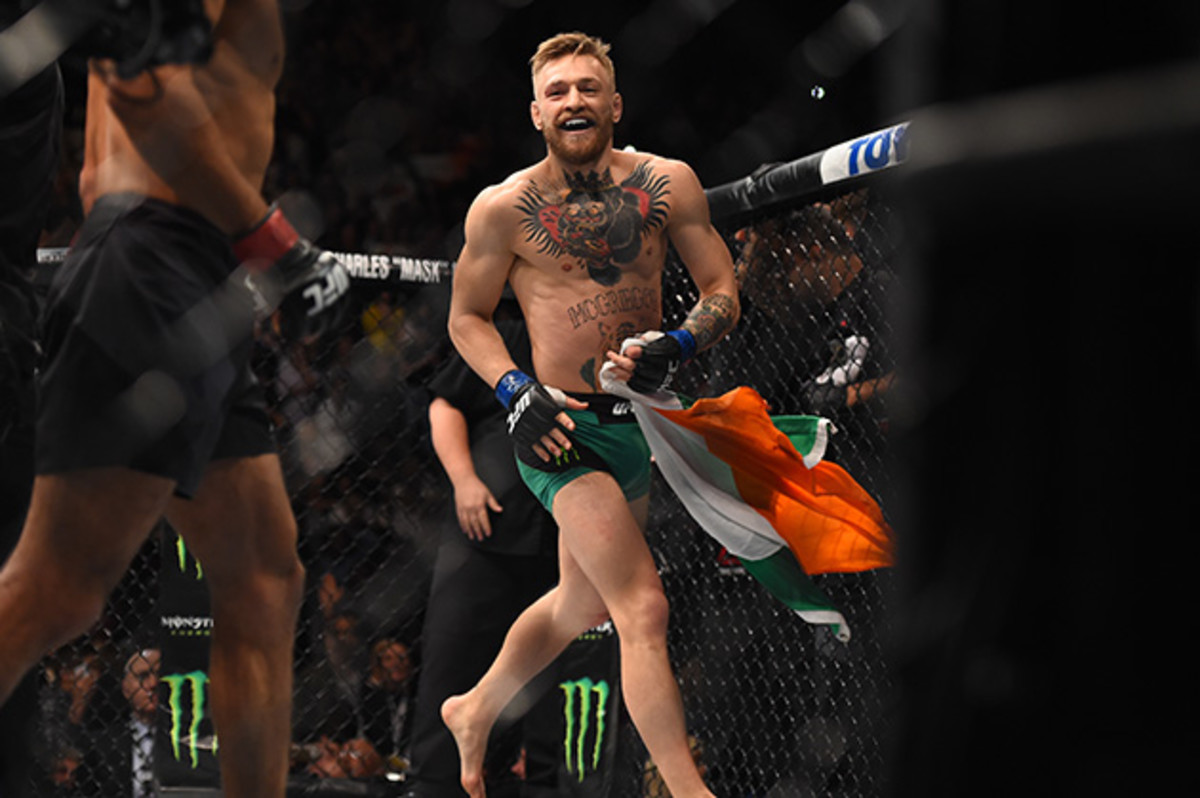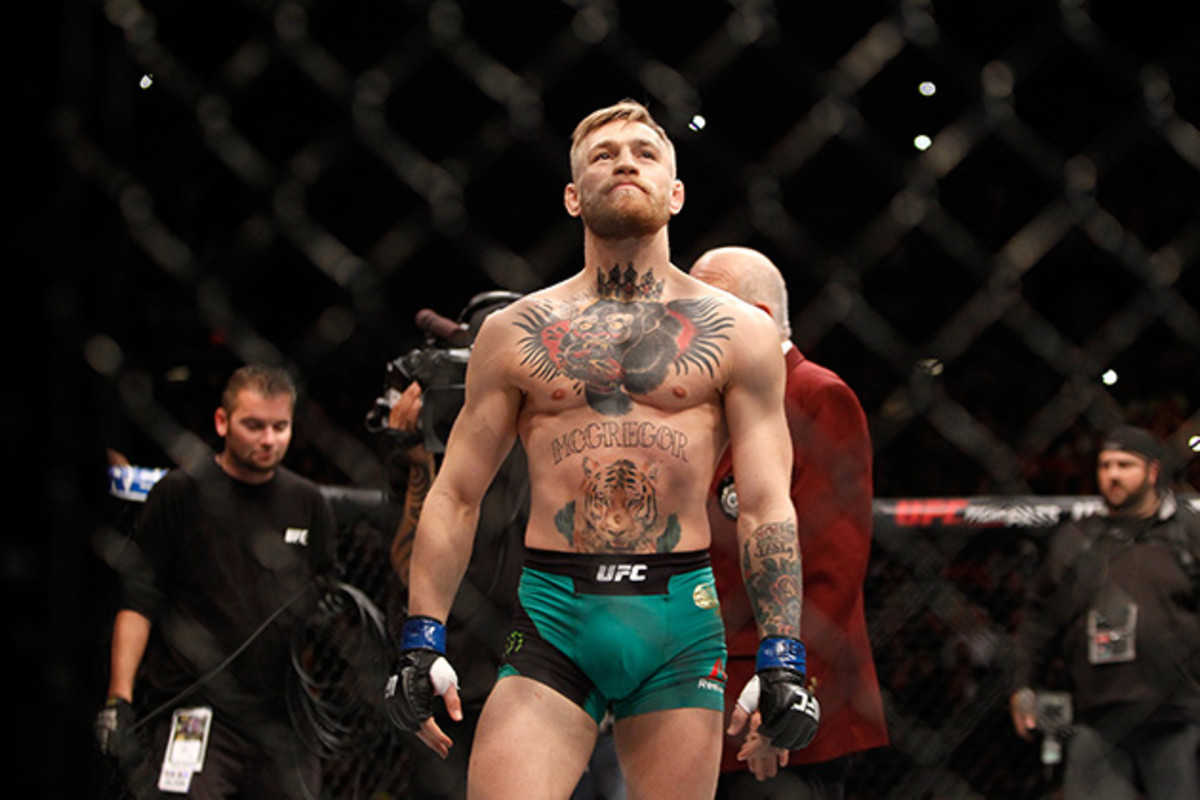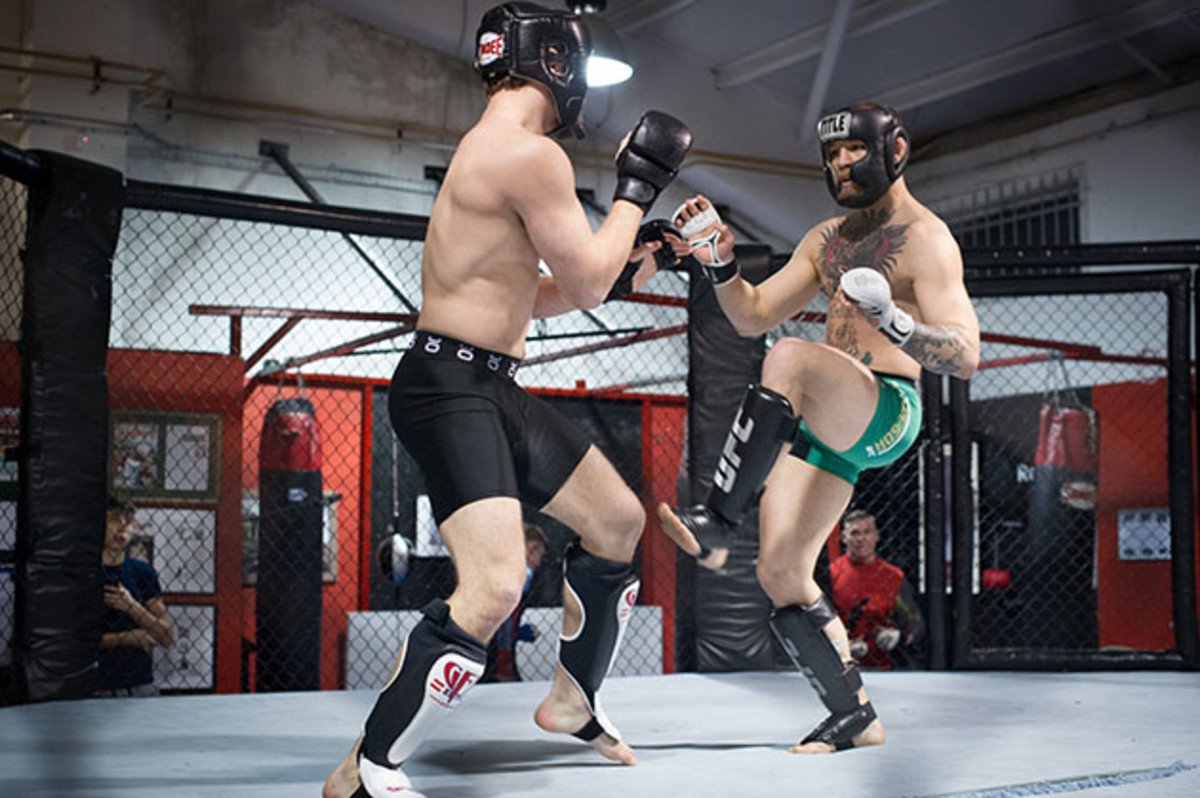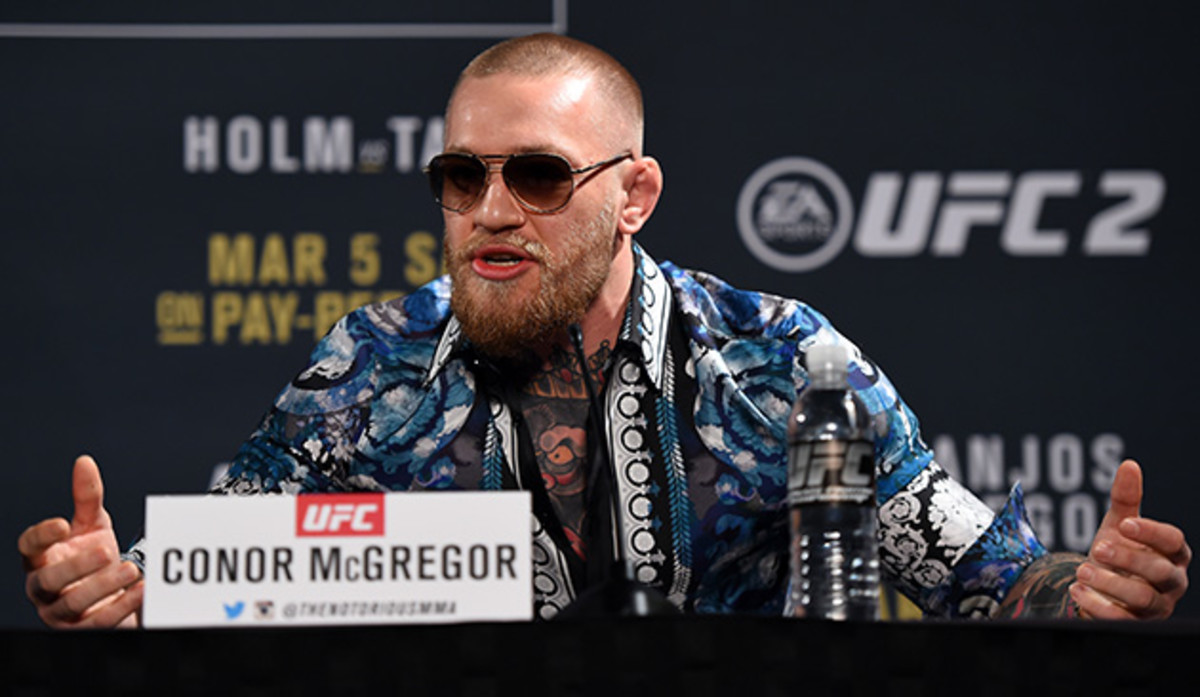UFC's latest star Conor McGregor still wants more

This story appears in the Feb. 29, 2016, issue of Sports Illustrated. Subscribe to the magazine here.
"Waitin' for Cooner Ma Greygar, are ye."
It's posed not as a question but as a knowing assertion on this relentlessly gray February day. The folks in and around the Straight Blast Gym—a charm-deprived fight club in a charm-deprived mini-mall in a charm-deprived exurb of Dublin—know this drill. They've seen the cameras and journalists and marketing folks come by the place, their ranks swelling steadily. And they know about the heroic waits that are endured before the visitors get an audience with the man they've come to see, Conor McGregor, the figure currently at the gravitational center of the UFC. Even the 10-year-old junior MMA fighter at the door says wisely, "He operates on his own time."
You've most likely heard the saying that a measure of power is how long you can keep people waiting. But for McGregor, powerful as he is right now, that's not really what this is about. You'd be hard-put to call McGregor a prima donna celebrity—not as long as he still thanks the countless fans after happily posing with them for photos. This is not another self-absorbed athlete—not as long as he ventures into monologues about the "deep responsibility" that comes with being an Irish champion, or talks with humility about "showing up to the gym every day as a white belt."

What we have instead is an athlete so singularly committed to his craft—"obsessed" is the word he uses again and again—that any decision he faces is viewed through a prism of, Does this help my fighting? If the answer is slow in coming, the commitments fall by the wayside, not unlike so many of McGregor's recent opponents. Text messages and voice mails pile up. Clocks are merely decorative. Food and drink are important only as they pertain to fighting weight. McGregor's friends, family and longtime girlfriend know about his organizing principles.
It's late Saturday night, more than a day after the appointed time, when McGregor finally feels it's an agreeable moment to chat. He arrives, beard in full bloom, the top of a tattoo—a gorilla eating a human heart—peeking above his Henley shirt. He is unrecognizable as the hilarious blowhard whose talent for self-promotion rivals his talent for fighting. The guy who once told a shorter opponent, "I can rest my balls on your forehead"? Who exhorted, "Kiss them feet, Nazi," before facing off against a German-based foe? Who earlier this month accepted the UFC's Fighter of the Year award for 2015 via video—he didn't want to interrupt his training—and lamented to other fighters, "I need to feed all you bums"? Nowhere to be seen.
Rafael dos Anjos (foot) withdraws from UFC 196 fight vs. McGregor
Instead, McGregor resembles a candidate on a job interview. And you want to hire him immediately. He makes eye contact, displays perfect posture and answers with measured, thoughtful responses, delivered with conviction but in a voice that sometimes requires you to lean in to hear. Yes, he's living what he calls "the whatever-I-want life, and it's a beautiful thing and an addictive lifestyle, this is." But, preempting the obvious follow-up that such a situation might trigger complacency, he adds, "I use it as motivation to continue to push on, continue to live this life and get more."
Yes, he concedes that he performs better the bigger the occasion. But in that quiet voice he adds, "Ultimately [pressure] is an illusion. What is it? Where is it? It's just a state of mind."
It becomes clear that inasmuch as McGregor has conquered the art of hype and promotion, he has done so only because it's another facet of the fight game, a skill to master, much as you would a spinning backfist or takedown defense. All those self-aggrandizing rants, popularized by YouTube, are just part of the prefight theater that at once takes a psychic price on the opponent and triggers pay-per-view buys.
As for McGregor's trademark predictive trash talk, it really isn't trash at all. If anything, it's the opposite. He's simply telling you his truths. When he predicts a knockout, he has seen it already. It's no more bombast or opinion than is, say, eight squared is 64 or Dublin is Ireland's capital.

He has visualized it. And hard as that can be to explain, he starts and restarts his answer until he's satisfied that you understand it. "I have a deep, deep belief that if I tell you I'm going to crack you with a clean shot to the chin inside one minute of the first round and you will be unconscious, well, then that's what will happen.... I let [my opponent] know. I let the world know. Then I put it in a time frame. Then I go out and do it."
It leads with the chin, the UFC does. The whole damn sport, in fact, has this aversion to risk aversion. Fighters don't traffic in the cautious safety of cliché. There are no cagey promoters, larding fighters' records by pitting them against tomato cans. There's no swirl of alphabet-soup sanctioning organizations, crowning different champs. Fighters can't—and don't want to—duck each other. In the UFC you're told when and who you're fighting.
But that free-swinging approach can also make the sport vulnerable. A year ago Ronda Rousey held all of mixed martial arts in a thrall—a badass fighter with serious presence, as sharp and precise with her words as with her fighting moves. But in November, Rousey was beaten up and then laid out by Holly Holm, one of the great upsets in the sport's history.
Conor McGregor featured on Sports Illustrated cover for first time
Rousey's face and aura were perforated in equal measure. Her career was suddenly placed in escrow. And the UFC had a problem. The same way nature abhors a vacuum, sports—this one in particular—abhors a star void. "It wasn't like, Oh, no, we need a star, what the f--- are we gonna do?" recalls Dana White, the UFC's unfailingly candid majordomo. "It was more like, There's an opportunity here. Which one of you guys is gonna fill it?"
Four Saturdays later White had his answer. A 27-year-old Irish fighter known as much for his mouth as his fists, Conor McGregor wasn't merely certain that he was going to defeat José Aldo—the champion, the favorite and a fighter who hadn't lost in more than a decade—to win the featherweight belt. Channeling the young Cassius Clay, McGregor specifically called the round, the first one. And he was so supremely certain that he promised that anyone who could furnish a betting slip confirming that they'd wagered on a first-round knockout would get free admission to his postfight party.
On fight night, while the undercard matches played out, UFC cameras showed McGregor in his dressing room, preparing to slip and counterpunch when Aldo charged at him. It was as if someone had leaked him the script in advance. The opening horn still echoing, Aldo lunged at McGregor, who countered with a left. The punch collided with Aldo's face. Aldo collided with the canvas. To hell with McGregor's habit of keeping folks waiting. Like that, the most anticipated fight of the year wasn't a fight at all; it was an intensely violent Vine. Official time of the knockout: 13 seconds. The postfight party made St. Patrick's Day look like a subdued, temperate weekday.

McGregor was already popular, especially among Irish fans, thousands of whom ventured to Las Vegas to see the fight. This, though, elevated him to new, global heights. He benefited from the It-ain't-braggin'-if-you-can-back-it-up dictum. Beyond that—and here again McGregor draws the inevitable Muhammad Ali comparisons—his showmanship is rooted in so much wit and cartoonishness that it all comes across as endearing. McGregor has fashioned with the public the same unspoken bargain that Ali did. I'll be outrageous for you. You recognize that it's part of the kabuki. And don't hold it against me.
In the days after the fight McGregor took to his Twitter account, @TheNotoriousMMA, to taunt potential challengers. "Line them up on their knees with their hands out. I want them to beg me." When a story surfaced that his image might grace the back of a one-euro coin, McGregor tweeted, "The boom is BACK baby!!! #F---TheRecession." On his Instagram feed he posted a photo of himself in a sports car, wearing a mask and brandishing a gun. (He claimed it was in preparation for a movie role.) "Let's put it this way," says White. "Conor is very calculating."
SI.com's P4P rankings: Cruz climbs back into Top 10 after Dillashaw win
Here's what McGregor didn't hype on social media: his rounds of sparring, his functional workouts, the incalculable number of push-ups and one-legged squats he has performed. His coach, John Kavanagh, hears all the references to McGregor's shocking personality and laughs. "Yeah, yeah," says Kavanagh. "I would say to people: Form your opinion after meeting him rather than just seeing the character on TV."
But the coach gets even more upset when asked about McGregor's apparent wealth of natural talent. "To be honest, I find that insulting towards him," says Kavanagh. "I've seen the work rate. I've seen him be the first one in here and the last one out, just training himself, at times going into the overtraining area. Now people are seeing the fruits of that labor and they call it natural talent? I can do nothing but smile at that."
For such a transcendent, unique fighter, McGregor's origin story is fiercely conventional. He grew up as a working-class kid in Dublin, the son of a cabdriver and a homemaker. He was a bright but indifferent student, filled with mischief but never in serious trouble. Tony McGregor brought his only son to the Crumlin Boxing Club when the kid was 10. Conor thought he loved soccer, but the fighting, that nourished him. "I just wanted to be able to be comfortable and confident if someone said something to me or something happened: strike hard, strike fast, make my exit safely," he says. "Then what happens is that it becomes addictive."

In his late teens McGregor was still fighting, adding jujitsu to his boxing foundation. But it was as a hobbyist. Following a path of least resistance, he began to work as an apprentice plumber. He saw the veterans on the job sites, faces drawn and creased, hardened hands and bodies aged beyond their years. Not for him. He reckons, "Yes, sir, no, sir, clock in, clock out. Why were you late? Why are you not in today? That's not how humans are supposed to live."
One day he decided he wouldn't show up for work and instead committed full-time to this fast-growing, Internet-fueled, newfangled sport, mixed martial arts. MMA drew its critics—especially in boxing-mad Ireland—but to McGregor there was something irresistible about combining his boxing with any and all other forms of combat. For his coach he chose Kavanagh, who told the kid flatly, "You want to be the champion of the world, it's pretty simple: It just has to be your every waking moment." McGregor bought in.
SI’s Media Circus hosts 2016 MMA media roundtable
He took his first pro fight in 2008. A year later, when he was 20, the UFC came to Dublin. McGregor sat (and stood) mesmerized by the spectacle. That night McGregor felt that his decision to devote himself to fighting had been validated. Inspired, he kept winning. A brawler but with obvious skills, he needed all of 16 seconds to win one fight. His next one lasted four seconds. Like a cult band, it was a matter of time before he went mainstream.
Around the same time, Dana White visited Dublin to receive an award from Trinity College. White kept getting asked the same question: "When are you gonna sign Conor?" White hadn't heard of McGregor but searched out some Internet clips and saw all the fuss. Intrigued, White invited McGregor to come to the UFC's Las Vegas headquarters. Marveling at McGregor's personality, White persuaded his partners to sign up this prospect for an inexpensive, low-risk contract. "A penny stock," White often calls it.
The stock took off. On April 6, 2013, McGregor won his UFC debut, requiring barely a minute to destroy the opponent. When he received a $60,000 knockout-of-the-night bonus, McGregor marveled, "I was collecting 188 euros a week off the social welfare, and here I am and I've got 60 G's bonus and my own pay!" He's had a half-dozen UFC fights since—against increasingly stiff opposition—and has looked better each time.

He's now up to 15 straight fights without a loss. As one of the few UFC fighters who get a cut of the pay-per-view take, McGregor is a millionaire many times over. Offers for movie roles and endorsements flood in. And McGregor isn't at all surprised. "I just figured out that if I gave my all into this game—if I put everything into the fight business—then I would eventually run the fight business," he says, without stopping to smile. "That's where we are right now."
Never mind the pain of being punched—"getting blasted" in UFC-speak—fighters will tell you that the real agony comes before the fight. "The cut," the molting of body mass to make your appointed weight, is a brutal physical/mental/spiritual challenge—so excruciating, in fact, that during the cut, these alpha men can be found crying, curled in fetal position.
Some fighters manage the cut better than others. For McGregor, it's pure hell. Standing 5'9", he walks around at 170 pounds or so; then he diminishes himself to reach the featherweight limit of 145 pounds. "Every time I'm deep in the cut," he says, "I say, This is where it's earned."
For his next fight McGregor will not have to endure this. Though McGregor is the reigning featherweight champion, on March 5 in Vegas he fights Brazil's Rafael dos Anjos for the lightweight belt. (Editor’s Note: Rafael dos Anjos pulled out of UFC 196 on Tuesday due to a broken foot and McGregor will fight Nate Diaz in a welterweight bout at UFC 196.) He'll only have to get down to 155 pounds. Never before has a UFC fighter held two belts simultaneously.
On its face it's nuts, another example of the UFC leading with its chin. Here's this newly minted star, and you not only want to rush him back into action, but do so against a bigger fighter? Kavanagh doesn't see it that way. This is simply the more honorable way to fight. "Somebody is in a bar, you don't stop and ask, What weight are you? You have to be able to defend yourself against whoever is attacking you." Could Kavanagh see McGregor going up to a third weight class? "Yes, I could," says the coach. "I've seen him spar plenty of welterweights. He's done very well."

More important, McGregor welcomes the challenge. "[Aldo] was the pound-for-pound No. 1. He had beaten everybody. I had beaten everybody. Then I beat him in 13 seconds," he says. "Really, what else is there to do?"
Ask him how he sees the Dos Anjos fight going, and he'll tell you he's not prognosticating. He's simply filling you in on a movie he's already seen. He says flatly, "In reality it will be a one-minute demolition job. I'm going to press him. Many people don't understand ring control. They think they do until they're against someone who really understands how to set traps, how to create holes in the octagon that they fall into. He will learn on March 5, and he will learn it pretty early."
And then what? "Take all the belts, take all the money, ride back to beautiful Dublin, Ireland, into the sunset."
He speaks with such conviction, you think that maybe he has visualized this. And then again, maybe he's wishing. But we'll care. And we'll wait. And we'll watch. Which, of course, means that Conor McGregor has already won.
